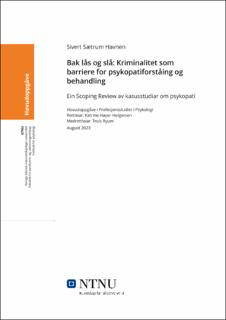| dc.contributor.advisor | Holgersen, Katrine Høyer | |
| dc.contributor.advisor | Ryum, Truls | |
| dc.contributor.author | Havnen, Sivert Sætrum | |
| dc.date.accessioned | 2023-12-08T18:19:26Z | |
| dc.date.available | 2023-12-08T18:19:26Z | |
| dc.date.issued | 2023 | |
| dc.identifier | no.ntnu:inspera:136848255:18327085 | |
| dc.identifier.uri | https://hdl.handle.net/11250/3106742 | |
| dc.description.abstract | Psykopati er ein alvorleg personlegdomstype, karakterisert av mellom anna mangel på
empati, utnytting av andre, impulsivitet og antisosial åtferd. Psykopati kostar samfunnet store
ressursar både blant dei som innehar det, men også offera deira, det har også lenge eksistert
ein tanke om at psykopati er resistent til behandling. Psykopati er i dag sterkt assosiert til
personar som gjer alvorlege kriminelle handlingar, og vert mykje nytta i ein rettsmedisinsk
samanheng. Den dynamiske modellen for psykopati er ein ny modell som tilbyr eit nytt
perspektiv på psykopati og psykopati sin underliggjande struktur, samt tilbyr ei tilnærming til
behandling.
Kasusstudiar har historisk sett hatt ei viktig rolle innanfor psykopatifeltet, og kan gje
ein peikepinn på kva det blir lagt vekt på i forsking på psykopati. Denne oppgåva tok sikte
på, gjennom ein sonderande litteraturstudie, å kartleggje omfanget av kasusstudiar på
psykopati målt med PCL (Psychopathy Cheklist), samt gje ei oversikt over fokus og tema i
desse artiklane gjennom ei enkel kategorisering. Vidare drøfter oppgåva korleis resultata kan
sjåast i lys av den dynamiske modellen for psykopati (DMP). Resultatet frå litteratursøket
gav 26 artiklar som møtte inklusjonkriteria. Desse fordelte seg mellom dei tre kategoriane
«Vurdering», «Behandling» og «Forståing». Ni av artiklane var knytt direkte til forsking på
psykopati, medan sytten i utgangspunktet fokuserte på eit anna fenomen.
Resultatet er i tråd med antagelsen om at forsking på psykopati har dreia seg inn mot
eit fokus på kriminalitet og åtferd, og det er blitt diskutert kor stor grad åtferdsbeskrivingar av
kriminelle handlingar bør vere ein del av psykopati. Eit mindretal av dei identifiserte
artiklane har fokus på underliggjande forståing av psykopati, og tilnærmingar til behandling,
slik den dynamiske modellen for psykopati freistar å bidra med. Moglege forklaringar for
dette blir diskutert. Av dei identifiserte artiklane som såg på behandling og forståing av
psykopati er det element som samsvarer med DMP. Desse er i middeltid i mindretal.
Psykopati er eit komplekst fenomen, og ved å opne for alternative teoriar og modellar i
psykopatiforsking vil ein kunne få ei djupare og breiare forståing av psykopati, og korleis det
kan handterast i samfunnet. DMP kan bidra med dette i framtidig forsking på psykopati. | |
| dc.description.abstract | Psychopathy is a severe personality type, characterized, among other things, by a lack
of empathy, exploitation of others, impulsivity, and antisocial behavior. Psychopathy incurs
significant societal resources, affecting both those who possess it and their victims. It has
long been believed that psychopathy is difficult to treat. Today, psychopathy is strongly
associated with individuals who commit serious criminal actions and is frequently utilized in
a forensic context. The dynamic model of psychopathy (DMP) is a new approach that offers
an alternative perspective on psychopathy and its underlying structure, as well as a treatment
approach.
Case studies have historically played an important role in the field of psychopathy,
providing insights into the focus of psychopathy research. This paper aims to conduct a
scoping review to map the extent of case studies on psychopathy measured with the PCL
(Psychopathy Checklist), as well as provide an overview of the themes and topics in these
articles through a simple thematic categorization. Additionally, it discusses how this aligns
with the dynamic model of psychopathy. The literature search yielded 26 articles that met the
inclusion criteria. These articles were distributed among three categories: “Assessment”,
“Treatment” and “Understanding”. Nine of the articles were directly related to psychopathy
research, while 17 initially focused on other subjects.
The results are in line with the assumption that psychopathy research has shifted its
focus towards crime and behavior, sparking discussions about the extent to which behavioral
descriptions should be part of psychopathy. A minority of the identified articles concentrate
on an underlying understanding of psychopathy and treatment approaches, as DMP attempts
to contribute with. Possible explanations for this trend are discussed. Among the identified
articles that focuses on understanding and treatment of psychopathy there are elements in line
with DMP. Psychopathy is a complex phenomenon. By opening for new approaches and
models in psychopathy research, one can achieve a deeper and broader understanding of
psychopathy as a phenomenon, and how it can be dealt with in society. DMP can contribute
to this in future psychopathy research. | |
| dc.language | nno | |
| dc.publisher | NTNU | |
| dc.title | Bak lås og slå: Kriminalitet som barriere for psykopatiforståing og behandling
- Ein Scoping Review av kasusstudiar om psykopati | |
| dc.type | Master thesis | |
